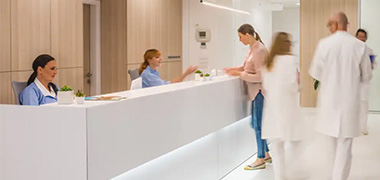How to start a career as a Medical Receptionist
Written by Jodie Magrath
7th December 2021
The role of a Medical Receptionist can be busy, but rewarding. Whether you work in a hospital, health clinic, doctor’s office or for a specialist health care provider, your days will be spent greeting patients, processing paperwork and payments and responding to patient enquiries. You’ll also perform a range of administrative duties such as answering phone calls, responding to emails and filing patient records. Medical Receptionists may also take on a specialist role such as a hospital admissions clerk or practice manager.
Medical Receptionists deal with patients from a range of backgrounds so you’ll need to have strong interpersonal skills and be an excellent communicator. You’ll need to be able to work as part of a team and be comfortable liaising with medical staff and other health professionals. Medical Receptionists should be organised and able to handle several tasks at one time. You’ll need to be capable of various administrative tasks and understand the importance of patient confidentiality.
If you’re interested in a career as a Medical Receptionist, the following courses can help you get started:
Certificate III in Health Administration
A Certificate III in Health Administration is an ideal course if you’re planning to work as a medical receptionist in a hospital, medical practice or community health centre. You’ll develop the skills to work with patients from diverse backgrounds, understand medical terminology and follow infection prevention and control measures.
Certificate III in Business (Medical Administration)
A Certificate III in Business (Medical Administration) will prepare you for work in a range of health administration roles. As well as developing business administration skills, you’ll also learn to manage patient records and understand medical terminology. This course also covers topics including patient confidentiality, processing medical accounts and controlling stock and supplies.
Certificate IV in Medical Practice Assisting
A Certificate IV in Medical Practice Assisting will give you the skills you need to support health staff in a range of settings. You’ll learn to handle medical specimens and maintain stock of medication and other medical supplies. This course also covers taking clinical measurements and performing electrocardiography (ECG).
A Medical Receptionist qualification could lead to a range of careers including the following job roles:
Admissions Clerk
An Admissions Clerk carries out administrative tasks when a patient checks in or out of a health facility, such as a hospital or other specialist medical centre. You might process patient paperwork and take payments and health insurance claims. Admissions Clerks might answer patient queries and liaise with families and carers.
Medical Secretary
A Medical Secretary takes care of a range of front office tasks at a medical or health care facility. You might answer phone calls and respond to emails or greet patients as they arrive. Medical Secretaries schedule appointments and ensure patient paperwork is complete. You might answer patient enquiries and process payments and health insurance claims.
Ward Clerk
A Ward Clerk performs various administrative tasks in a hospital ward. You might process patient paperwork and update medical records. Ward Clerks may answer telephone calls and respond to patient enquiries. You may liaise with family members and give directions to visitors to the ward.
Getting started
If you’re interested in a career as a Medical Receptionist , make sure you gather all the relevant information before you enrol in a course of study. Course providers usually vary in the way they deliver their programs so it’s important you find the course that best meets your needs. Find out about course duration, costs, any prerequisites and the content the course will cover. Once you have all the information you can compare details and work out which qualification suits you best.







